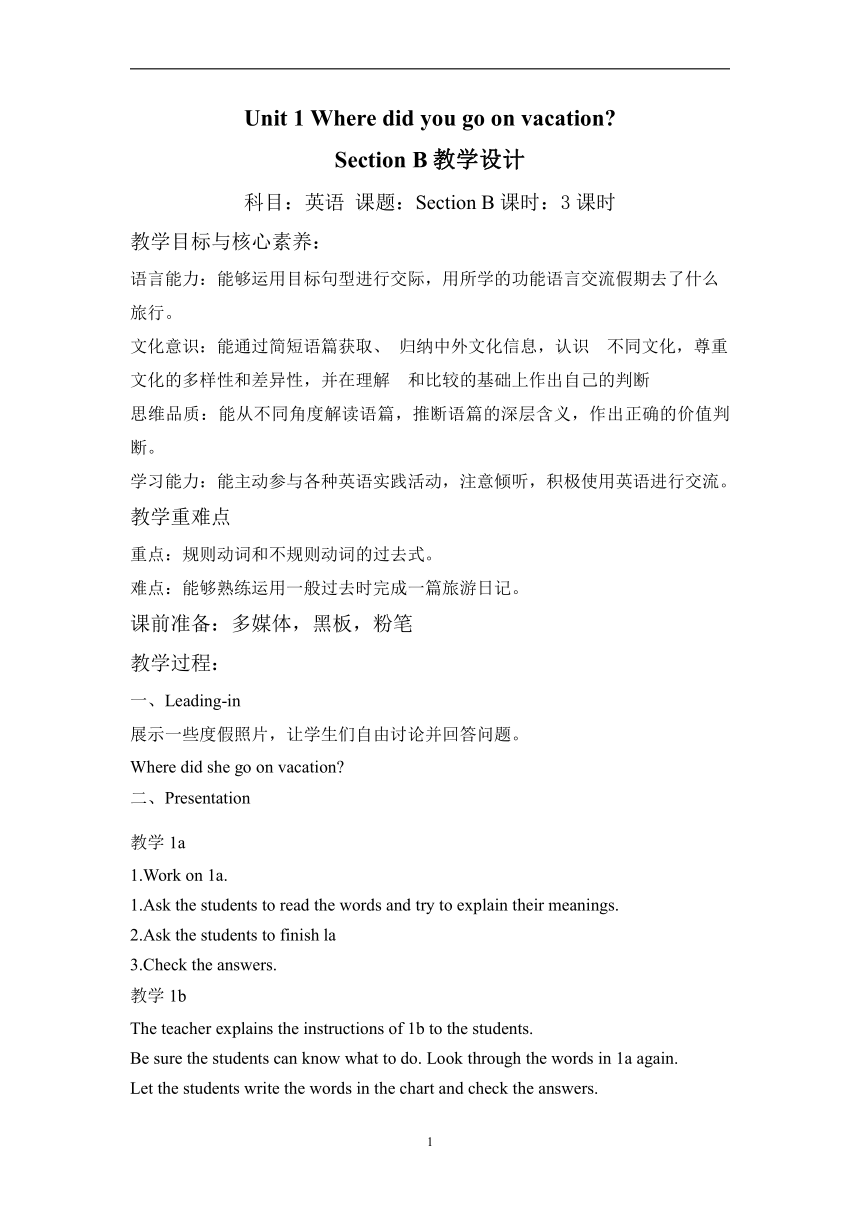
Unit 1 Where did you go on vacation Section B教学设计 科目:英语 课题:Section B 课时:3课时 教学目标与核心素养: 语言能力:能够运用目标句型进行交际,用所学的功能语言交流假期去了什么旅行。 文化意识:能通过简短语篇获取、 归纳中外文化信息,认识 不同文化,尊重文化的多样性和差异性,并在理解 和比较的基础上作出自己的判断 思维品质:能从不同角度解读语篇,推断语篇的深层含义,作出正确的价值判断。 学习能力:能主动参与各种英语实践活动,注意倾听,积极使用英语进行交流。教学重难点 重点:规则动词和不规则动词的过去式。 难点:能够熟练运用一般过去时完成一篇旅游日记。 课前准备:多媒体,黑板,粉笔 教学过程: 一、Leading-in 展示一些度假照片,让学生们自由讨论并回答问题。 Where did she go on vacation 二、Presentation 教学1a 1.Work on 1a. 1.Ask the students to read the words and try to explain their meanings. 2.Ask the students to finish la 3.Check the answers. 教学1b The teacher explains the instructions of 1b to the students. Be sure the students can know what to do. Look through the words in 1a again. Let the students write the words in the chart and check the answers. 教学1c&1d 阅读1c和1d的标题和问题,预测听力材料的内容,做到心中有数,然后播放录音,边听边记录细节信息,听完录音完成1c和1d的任务。 再听一遍录音,听完后核对答案。 角色扮演Role-play the conversation. 学生两人一组,针对Lisa的度假情况用下面的句型进行问答对话: Where did ... What did ... Did she ... How was ... How were ... Discussion (2a) First ask the students to discuss the questions with their partners; 1.What do people usually do on vacation 2.What activities do you find enjoyable Reading (2b) Ask the students to read Jane's diary entries fast, and let them try to answer the two questions in 2a. Check the answers. Explanation to the text 1. How did you like it 你认为它怎么样 How do you like... 意为“你觉得...怎么样 ”,用于询问对方的观点或看法,相当于What do you think of... 或How do you feel about... 例:How do you like your new job = What do you think of your new job 你觉得你的新工作怎么样 2. Still no one seemed to be bored. 好像仍然没有一个人感到无聊。 bored表示“感到厌倦的”,用来说明人的感受; boring表示“令人厌烦的、无趣的”,用来说明事物的特征。 例:She is bored with her job. 她对自己的工作不感兴趣。 The lecture was deadly boring. 那讲座真是乏味极了。 以-ed结尾的形容词,通常用来修饰或者描述人,以-ing结尾的形容词,通常用来修饰或者描述物。 类似的形容词还有:interested/ interesting;excited exciting;surprised surprising。 3. I arrived in Penang in Malaysia this morning with my family.今天早上我和家人到达了马来西亚槟城。 辨析:get, arrive, reach(三者都有“到达”之意,但用法上有所区别) get 不及物动词,其后若跟地点名词,要用get to How does he get to school 他是怎样到校的 arrive 不及物动词,后面接地点名词时需加介词in或at,大地点用arrive in,小地点用arrive at。如果不接地点。则直接用arrive Lisa will arrive in Beijing next week.莉萨将会于下周到达北京How did he arrive at the airport 他是怎样到机场的 reach reach是及物动词,后面可直接跟宾语,般不接地点副词 Please reach the TV station on time.请按时到电视台 注 ... ...
~~ 您好,已阅读到文档的结尾了 ~~